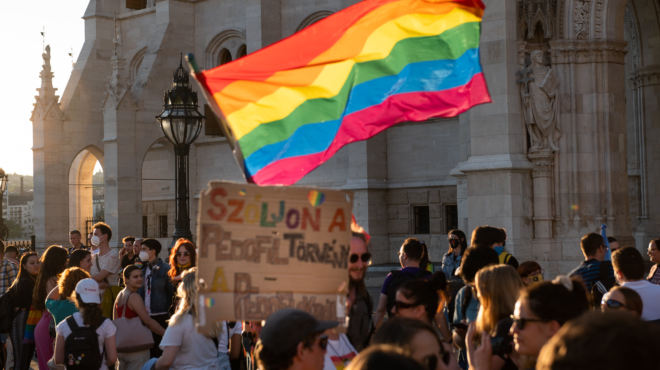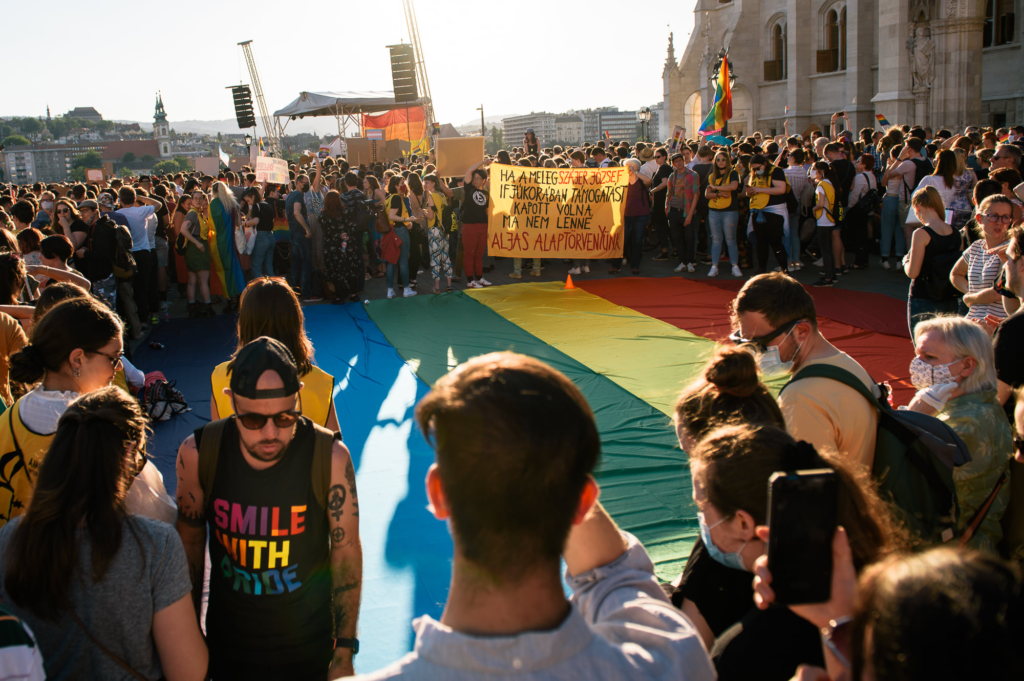Interview about the situation in Hungary with cultural anthropologist Rita Beres-Deák
Author: Michal Pitoňák
Link to a version published in the Czech language
Photographs: Budapest Pride with permission given to Rita Béres-Deák
Hello Rita, we know each other from various occasions and conferences where we met, your research in Hungary has reached a wider international audience, can you just briefly introduce yourself and let us know about your current scholarly and activist goals?

I am a cultural anthropologist, I studied gender at the Central European University. I have also been involved in LGBT+ activism in Hungary for over 20 years, including the Getting to Know LGBT People program and the School Living Library, which I will talk about below. My Ph.D. research focused on the relationship of same-sex couples with their families of origin, and this was also the basis of my book, Queer Families in Hungary.
Can you in fact distinguish your scholarly work from that one of an activist, policymaker, or advocate for rights?
Of course, they can be distinguished, but they are deeply intertwined. The very reason I started my dissertation research was my experience in the LGBT+ community that the relationship with the family of origin is a crucial problem for many same-sex couples, yet it is underresearched; when choosing this topic, I partly wanted to address a gap in scholarship but also to inform activism. And cultural anthropology and gender studies can be put to the service of activism: they help see the underlying systemic problems and also provide arguments against those who claim that certain phenomena or values are ‘universal’ or ‘natural’.
I am glad that you have accepted my invite for this interview especially during this time, the current situation of LGBT+ people in Hungary is rapidly deteriorating, so I wanted to focus this interview on the current situation.
The law is called the “Paedophilia Act”, although it mostly focuses on anti-LGBT+ legislation. Why does this law conflate LGBT+ education with serious crimes such as child abuse and child pornography, and what does the Hungarian government aim to achieve by forming this law in such a way?
On the one hand, the government has been promising measures against pedophilia for quite a while, at least since the child porn scandal of the Hungarian ex-ambassador to Peru last year. Calling the law ‘Paedophilia Act’, they can claim they have kept this promise without having to invest more money into the child welfare system (they are loath to invest money into any welfare institutions). Also, public opinion is united against paedophilia, so those who have not read or understood the actual text of the law will automatically support it. Moreover, the government has potentially realized that an explicitly ‘anti-gay propaganda law’ like the one in Russia would be strongly objected to, not only by the EU but also by the general population, most of whom do not want Hungary to follow Russia (less because they recognize Putin as a dictator and more because they perceive Russia as a former colonizer of Hungary during state socialism).
The law is similar to the Russian “Gay Propaganda Law” and the former UK law Section 28, which banned LGBT+ education for minors. What are the main similarities between the new Hungarian law and the Russian law and Section 28, and how do they differ? Possibly – Is Orban seeking closer alignment with Russia with the implementation of such laws, and to try and distance itself from the EU?
The UK section 28 only referred to schools and councils, and was against “promoting the teaching of the acceptability of homosexuality as a pretended family relationship.” Similarly, the Russian law only bans the depiction of homosexual relationships, not homosexuality per se, although it does apply to the media as well. In contrast, the Hungarian law bans the “portrayal or promotion” of homosexuality or any gender identity that is different from the person’s birth sex; it basically orders total silence about LGBT+ people, not only their relationships. An example: TV series which depict non-heterosexual youth struggling with their sexual orientation or coming out but who are not shown to have a relationship during the series would have been acceptable in the 1980s UK. In Hungary, such a series will have to be moved to after 10 PM and labeled as for adults only.
We do not know how many parts Russia had in this law; they often operate in the background, like financing the outwardly American World Congress of Families. However, I believe that the motivations for this law were related to the country’s internal politics more than to international alliances.
Fearing that women’s emancipation would lead to the diminishing of men’s privileges and the birth of fewer children, they try to demonize anything that deviates from traditional gender roles.
The law passed with only one vote against it. Why did the opposition decide to abstain rather than oppose the bill?
The opposition makes it seem that they found the bill so outrageous that they would not stoop to even take part in the vote. In fact, they were probably afraid that should they vote “no”, they would be labeled pedophiles. This kind of accusation would not be new against liberals: in 2005. Zsolt Semjén, leader of the Christian Democratic Party and deputy Prime Minister at the time, said: “Vote for SZDSZ (=Association of Free Democrats, the leading liberal party at the time) if you want your teenage son to be sexually initiated by an elderly man with a beard” (the beard being covert antisemitism here). Apparently, the opposition believed that their voters would agree with FIDESZ’s framing of the bill, and opposition parties would lose supporters by voting against it. Of course, it is likely that the bill would have passed anyway, FIDESZ having a two-thirds majority and their MPs not being allowed to vote against a bill proposed by their party. Still, I think the 157 vs. 1 (the 1 came from an independent MP) is a really shameful result.
Why is the Hungarian government focusing on laws discriminating against LGBT+ rights in particular? What is the background for the attack on LGBT+ rights in Hungary and how does the government hope to gain votes by passing this law? And possibly, to what extent is the focus on anti-LGBT+ laws a distraction from serious issues of governmental failure such as the mishandling of the Covid crisis?
There is certainly an element of distraction, but they could have chosen many other things for distraction, of course. The anti-LGBT+ line of the government has been going on for quite some time, most intensively for the past one year, starting with the ban on changing one’s name and ‘birth sex’ (substituting gender) on official documents, through banning individual adoption and now this law. The main root of the government’s homophobia may be its adherence to pronatalism and traditional gender roles. Fearing that women’s emancipation would lead to the diminishing of men’s privileges and the birth of fewer children, they try to demonize anything that deviates from traditional gender roles. Obviously, the very existence of LGBT+ people is proof that the patriarchal gender hierarchy is not the only alternative. By restricting the visibility of LGBT+ people, the government probably hopes that the next generation will not see any alternatives to the heteronormative, patriarchal family, so they will reproduce that model again.
Advertisements showing LGBT+ people will be banned, and any TV shows with LGBT+ characters moved to after 10 PM.
How will the new law affect the LGBT+ community in Hungary and, in particular, how will it affect LGBT+ minors?
One possibility is that the law will not be enforced but will just be there on paper, which might still induce self-censorship in educational institutions, advertising agencies, or TV channels. If the law is fully enforced, it will put an end to any school sensitization programs aimed at informing minors about LGBT+ issues and teachers would also risk losing their jobs if they decided to talk about such matters in class. Advertisements showing LGBT+ people will be banned, and any TV shows with LGBT+ characters moved to after 10 PM. There are debates whether the government will try to ban the Pride March; I think they will, as there is a long history of right-wing parties trying to do so. A less likely but not impossible consequence is that LGBT+ organizations will be required to put the “over 18” banner on their websites and will be forbidden to promote their activities among minors (e.g. will not be allowed to promote their activities and services on websites which are not for adults only) or will be required to make sure that no minors participate at their events. The least likely is that the ban will extend to social media; on the one hand, it would require a bigger amount of control than FIDESZ has, and on the other hand, there is likely to be outrage if people’s internet activities are restricted. (In fact, the only bill that FIDESZ has withdrawn in the past 10 years due to widespread protests was a bill on taxing the internet – far more people were mobilized against this motion than against putting an end to the independence of courts or destroying the healthcare system). Therefore, I do not believe that children will grow up not knowing anything about LGBT+ people. I do fear, however, that some of this knowledge may come from unreliable sources like fake news websites. What is worse, they will not be able to ask any adults for help, as these adults will not be allowed to talk to them about same-sex sexuality. They will not be able to attend any LGBT+ events, where they could meet people in a similar situation and get support. Homo- and transphobic bullying is likely to rise, with teachers not being allowed to set children’s misconceptions right. And ironically, such a law will make it not less but more likely that teenagers may fall victim to pedophiles – an isolated gay teenager, seeing no other opportunities to explore his identity, might give in to grooming by older men, and a recently published story sheds light on similar dangers for teenage lesbians.
Though the government might use the trope of “children’s healthy development”, what they really mean is not what is healthy for the child but what is healthy for “the nation”.
Research on minority stress and well-being in sexual minority and gender minority people clearly shows that exposing minors to affirmative LGBT+ content reduced negative mental health impacts, how can we understand that the Hungarian government is defending this law, (which will in fact have negative impacts on mental health) as one aiming to protect mental health and functioning of children?
Naturally, they claim that such research is biased and manipulated, but we also need to understand that they are operating under a different paradigm. Hungarian nationalism does not consider the interests or rights of the individual. They are worried that the Hungarian people, whom they consider unique and potentially superior to all other nations, might disappear because of the falling birthrate, and the country might be overcome by Roma people and immigrants. As Viktor Orbán said on the radio in May this year: “If there are no Hungarian children, there is no Hungarian future, either. Some people will live on this land, but it will not be us.” Therefore, the most important duty of every Hungarian is to give birth to children, and LGBT+ people are seen as running counter to this aim (the fact that rainbow families can be created in any other way than adoption is not present in public discourse). The interests, desires or mental health of the individuals must be subordinated to this higher aim. This might sound strange, but indeed it has historical predecessors, whether from the 1950s when people were expected to work to exhaustion in order to rebuild the country destroyed in the war, or in Hungarian peasant culture, where the interest of the family overrides that of the individual (one of the most common negative responses to a coming out is still that the LGBT+ person is destroying the family’s reputation, and they are often expected to restrain their public visibility as LGBT+ people for their family’s sake). Though the government might use the trope of “children’s healthy development”, what they really mean is not what is healthy for the child but what is healthy for “the nation”.
The newly introduced law specifically targets the content in schools and is in fact a clear example of state censorship of LGBT+ information provided to minors, what was the situation in sex-ed in schools before the law was introduced, were there some affirmative, sensitizing, anti-homonegative, etc. programs introduced already – from how high will the educational system fall?
The main school curriculum reinforced traditional gender roles and did not include any mention of alternative gender identities or sexual orientations. However, a handful of sensitizing programs do exist, which schools could invite, though recently it has been mostly the private schools that have done so. One is the “Getting to Know LGBT People” program, which has been running since 2000, and which uses a combination of the storytelling method (the LGBT+ presenters using their life stories to illustrate issues like homophobia, coming out, or discrimination) and sensitizing exercises and materials (e.g. anti-bullying videos) to facilitate a discussion with teenagers and adults. The other is the School Living Library, where small groups of children can have discussions with individuals from stigmatized groups, including gay men, lesbians, bisexuals, trans men and women, asexuals, and family members of LGBT+ people. Labrisz Lesbian Association has also written teachers’ manuals to help teachers facilitate the discussion of LGBT+ topics at school and has produced some short films on school homophobia that could be processed in class. They have also published the fairy tale collection Wonderland is for Everyone, a collection that includes stories about LGBT+ and gender-nonconforming characters, besides other minority groups (Roma, people with disabilities, adopted children, etc.), has worked out lesson plans for teachers to discuss these stories in class and has recently called on human rights educators to create their own exercises for the stories. Amnesty International Hungary also has a school sensitization project, which gives children the opportunity to discuss transgenderism through an invented story. Transvanilla Transgender Association has occasionally held workshops in schools, and several other human rights programs have touched upon LGBT+ topics during their classes.
How does the LGBT+ community in Hungary plan to act against this law and what can be done to help them?
This is difficult to answer, as we do not yet know where the state will attack first. Several organizations and private persons have vowed civil disobedience, meaning they would go to the pride march and other events even if these were banned, and many teachers have vowed to continue speaking in class about LGBT+ issues. Organizations more dependent on the state or the municipality are less free in this respect; Budapesti Esély (Budapest Opportunity), which operates the School Living Library, has declared that they will comply with the law and if they are banned from schools, they will continue organizing living library events for adults only. Strategic litigation is also likely, and Hungarian human rights organizations are strongly involved in the EU infringement procedure against Hungary.
In the past few days, several EU politicians have declared that Hungary should be excluded from the EU. I believe this could help if it is done fast – then Orbán would not have time to build up a hate campaign against the EU.
The EU has discussed using financial measures against Hungary due to violations of the EU’s core values before. How likely do you think the EU is to take action against Hungary for passing this law, and how helpful would EU intervention be in this case?
This is not the first time Orbán has gone against the main principles and values of the EU and Brussels has always let him get away with it. Unfortunately, there are probably business interests behind this – several German car companies have factories in Hungary, which is very advantageous for them given the cheap Hungarian workforce. Because of this, Germany is always lenient towards Hungary, as a “Huxit” would mean financial damage for them. I think if – similarly to some American car factories – German car manufacturers also declared that they consider leaving Hungary because of the new homophobic law, leading politicians in Germany and the EU would be willing to consider much harsher measures.
In the past few days, several EU politicians have declared that Hungary should be excluded from the EU. I believe this could help if it is done fast – then Orbán would not have time to build up a hate campaign against the EU. Though he has tried to discredit the EU on several occasions, polls show that the population of the country still overwhelmingly supports Hungary’s EU membership. Being excluded from the EU might cause enough outrage for people to take action, even violently, against the government. If, however, this procedure is more lengthy, Orbán will have enough time to convince the population that the EU is pure evil and Hungary is better off with allies like Russia or China.

How do you view the situation for Hungary’s LGBT+ community in the upcoming years – is there a possibility it could change after next year’s parliamentary elections?
Unfortunately, at this point it is hard to imagine an oppositional victory at next year’s elections; this very law has shattered the already fragile coalition between left-wing parties and Jobbik, a strongly racist and homophobic right-wing party. Without the considerable voter base of Jobbik, left-wing parties do not have enough support to win, especially as election law has been modified in a way favorable for FIDESZ, and votes are also known to have been tampered with. Some political analysts claim we have passed the point where it was possible to remove FIDESZ through elections. Yet, should this happen, the outcome depends on which parties get into power. Left-wing parties uniformly stand up for LGBT+ rights, so a leftist coalition would bring about a favorable change. Should Jobbik win, however, the situation would not improve or would even get worse (it is Jobbik who has been putting forward motions to ban the Pride March every single year). Though a coalition of Jobbik and left-wing parties is unlikely now, in such a case it would be interesting to see which side is willing to make a compromise; in a Jobbik-majority government, left-wing parties may potentially give up their LGBT+ agenda in order to be able to stay in power.
Photograph was taken by Budapest Pride during the protest prior to voting on the discriminatory bill. The transparent text says: “If gay József Szájer had received support as a child, we would not have such a nasty Constitution (Fundamental Law) today.”








